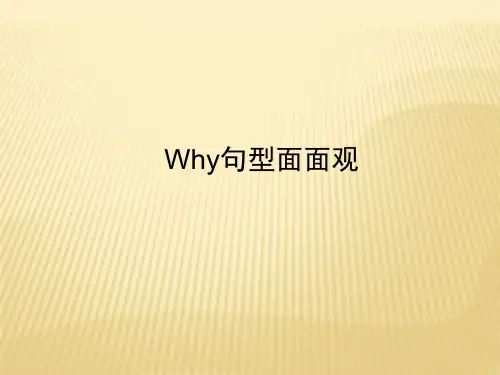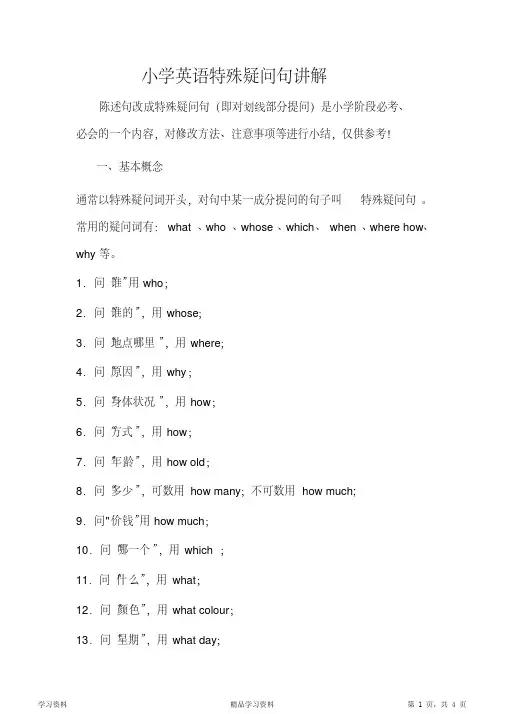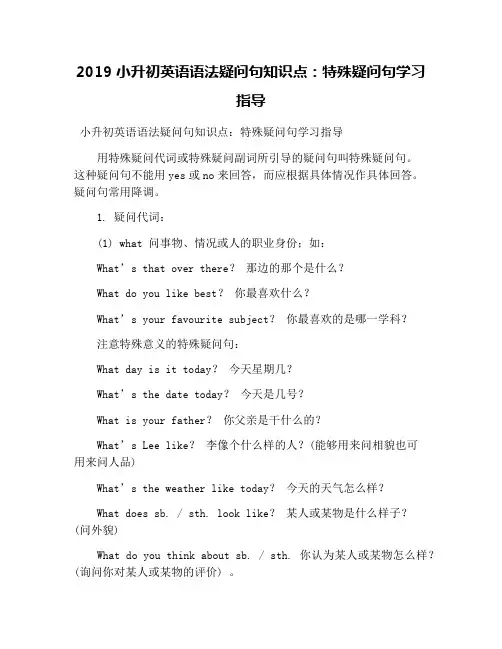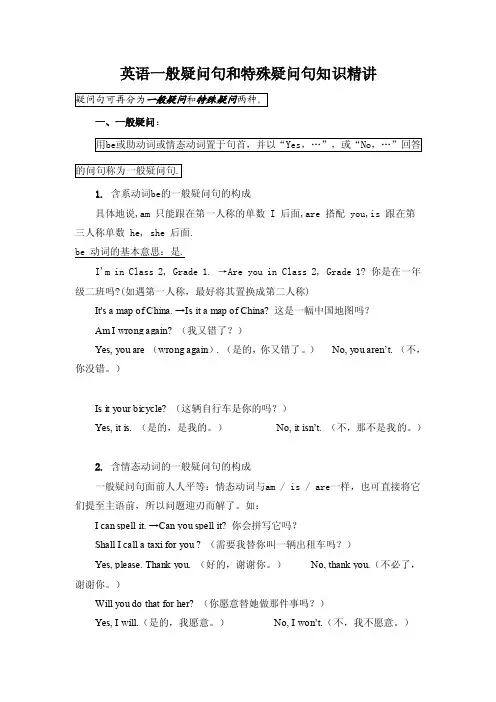小学英语语法之特殊疑问句资料讲解
特殊疑问词详解及特殊疑问句练习

一、特殊疑问句的定义:用“特殊疑问词”引导的疑问句叫做“特殊疑问句”,朗读句子时用降调。
回答特殊疑问句时不能用yes或no而必须问什么就回答什么。
例如:Where's the restaurant? 哪里有餐厅?It’s near the station. 车站附近。
二、特殊疑问句的用法:对划线部分提问,可以用什么疑问词?1.对“地点,位置”提问,用“where”。
例如:They are studying Chinese in China. → Where are they studying Chinese?2.就“时间”提问,用“when”。
例如:She came to Japan in 1990. → When did she come to Japan?3.对“具体时刻、几点钟”提问,用“what time”。
例如:He often goes to bed at ten. → What time does he often go to bed?4.对“谁”提问,用“who”(主格)或“whom”(宾格)。
例如:The girl is standing at the station. → Who is standing at the station?They often go home with Tom. → Whom do they often go home with?5.对“谁的(人或物)”提问,用“whose”。
例如:I will meet my father. → Whose father will you meet?6.对“年龄,多少岁”提问,用“how old”。
例如:The man over there is sixty. → How old is the man over there?7.对“哪一个”提问,用“which”。
例如:She likes the new skirt. → Which skirt does she like?8.对“颜色”提问,用“what colour”。
小学英语特殊疑问句精讲

Why +not +行为动词原形+其他?
What a fine day! Why not go to the park and have a picnic there? 天气真好啊!为什么不去公园野餐呢?
Good idea! 好主意!
Because I have a test this week. 因为我这周有个测试。
Why isn’t Tom at home? 汤姆为什么不在家?
Because he goes to have a piano lesson. 因为他去上钢琴课了。
Why引导的特殊疑问句还可以用来向对方提出建议。
1.Why+助动词+(not)+主语+其他? Because+陈述句。
Why does he like pandas? 他为什么喜欢大熊猫?
Because they are very cute. 因为它们很可爱。
Why don’t you go to school with me? 你为什不和我一起去学校?
Because I have got a bad cold. 因为我得了重感冒。
2. Why+情态动词+(not)+主语+其他? Because+陈述句。
Why can Jim get the job? 为什么吉姆能得到这份工作?
Because he is good at English speaking. 因为他英语口语好。
Why句型面面观
疑问词why意思是“为什么”,用来询问原因、理由。
小学英语语法之特殊疑问句资料讲解共31页

谢谢!
36、自己的鞋子,自己知道紧在哪弱。——拉罗什福科
xiexie! 38、我这个人走得很慢,但是我从不后退。——亚伯拉罕·林肯
39、勿问成功的秘诀为何,且尽全力做你应该做的事吧。——美华纳
40、学而不思则罔,思而不学则殆。——孔子
小学英语语法之特殊疑问句资料讲解
1、纪律是管理关系的形式。——阿法 纳西耶 夫 2、改革如果不讲纪律,就难以成功。
3、道德行为训练,不是通过语言影响 ,而是 让儿童 练习良 好道德 行为, 克服懒 惰、轻 率、不 守纪律 、颓废 等不良 行为。 4、学校没有纪律便如磨房里没有水。 ——夸 美纽斯
5、教导儿童服从真理、服从集体,养 成儿童 自觉的 纪律性 ,这是 儿童道 德教育 最重要 的部分 。—— 陈鹤琴
(完整版)小学英语特殊疑问句讲解(超详细)

小学英语特殊疑问句讲解陈述句改成特殊疑问句(即对划线部分提问)是小学阶段必考、必会的一个内容,对修改方法、注意事项等进行小结,仅供参考!一、基本概念通常以特殊疑问词开头,对句中某一成分提问的句子叫特殊疑问句。
常用的疑问词有:what 、who 、whose 、which、when 、where how、why等。
1.问“谁”用who;2.问“谁的”,用whose;3.问“地点哪里”,用where;4.问“原因”,用why;5.问“身体状况”,用how;6.问“方式”,用how;7.问“年龄”,用how old;8.问“多少”,可数用how many;不可数用how much;9.问"价钱”用how much;10.问“哪一个”,用which ;11.问“什么”,用what;12.问“颜色”,用what colour;13.问“星期”,用what day;16.问“什么时候”,用when;17.问几点用What’s the time?或What time is it?如果掌握规律,就变得简单多了。
总结一条就是:“特殊疑问词+一般疑问句”,但特殊疑问词的确定要根据划线内容确定,在小学阶段常出现的有以下几种:1.划线部分是“事或物”,特殊疑问词用whatEg: This is a bag. ---What is this?We often play football on Sundays .---What do you often do on Sundays ?2、划线部分是“人”,特殊疑问词用whoEg:She is my sister. ---Who is she ?3、划线部分是“地点”,特殊疑问词用whereEg:The apple is on the desk.---Where is the apple ?4、划线部分是“时间”,特殊疑问词用what time或when Eg:It's six thirty . ---What time is it ?I usually get up at six forty .--- When do you usually get up?5、划线部分是“年龄”,特殊疑问词用how oldEg:I am twelve . ---How old are you?My mother is thirty- two . ---How old is your mother ?6、划线部分是“职业”,特殊疑问词用whatEg:Tom is a worker. ---What is Tom?/What do you do ?7、7、划线部分是“颜色”,特殊疑问词用what colourEg:My hat is blue . ---What colour is your hat?8、划线部分是“数量”,特殊疑问词用how many或how much Eg:I can see five birds in the tree.---How many birds can you see ?There is some tea in the cup.---How much tea is there in the cup ?9、划线部分是“多少钱”,特殊疑问词用how muchEg:This book is ten yuan . ---How much is this book ?10、划线部分是“形容词性物主代词或名词性物主代词”,特殊疑问词用whoseEg:That is my shirt . ---Whose shirt is that ?二、小学英语对划线部分提问答题口诀:一代(用疑问词代替划线部分),二移(把疑问词移至句首),三找(找is , are ,can,would)抄在疑问词后,没有则用do,does(用于主语是第三人称),出现I am 则直接改为Are you),四抄(照抄其它部分)五改(出现some,要考虑是否改为any。
2019小升初英语语法疑问句知识点:特殊疑问句学习指导

2019小升初英语语法疑问句知识点:特殊疑问句学习指导小升初英语语法疑问句知识点:特殊疑问句学习指导用特殊疑问代词或特殊疑问副词所引导的疑问句叫特殊疑问句。
这种疑问句不能用yes或no来回答,而应根据具体情况作具体回答。
疑问句常用降调。
1. 疑问代词:(1) what 问事物、情况或人的职业身份;如:What’s that over there?那边的那个是什么?What do you like best?你最喜欢什么?What’s your favourite subject?你最喜欢的是哪一学科?注意特殊意义的特殊疑问句:What day is it today?今天星期几?What’s the date today?今天是几号?What is your father?你父亲是干什么的?What’s Lee like?李像个什么样的人?(能够用来问相貌也可用来问人品)What’s the weather like today?今天的天气怎么样?What does sb. / sth. look like?某人或某物是什么样子?(问外貌)What do you think about sb. / sth. 你认为某人或某物怎么样?(询问你对某人或某物的评价) 。
What will you go there for?你去那儿干什么呢?(问目的) What book do you want?你想什么书?(2) who 问人(作主语、宾语或表语) ,如:Who’s the man speaking over there?在那边说话的那人是谁?(3) whom问人(作宾语) ,如:Whom / who are you talking about?你们在谈论谁?(4) whose问人(作主语、宾语、表语或定语) ,如:Whose is this?这是谁的?Whose bag is this?这是谁的口袋?Whose did you take?你拿了谁的?(5) which 问人或事物(表选择) ,如:Which will you take?你想拿哪一个?Which one would like to buy?你想买哪一个?。
五年级英语一般疑问句和特殊疑问句知识精讲

英语一般疑问句和特殊疑问句知识精讲疑问句可再分为一般疑问和特殊疑问两种。
一、一般疑问:用be或助动词或情态动词置于句首,并以“Yes,…”,或“No,…”回答的问句称为一般疑问句.1.含系动词be的一般疑问句的构成具体地说,am 只能跟在第一人称的单数 I 后面,are 搭配 you,is 跟在第三人称单数 he, she 后面.be 动词的基本意思:是.I'm in Class 2, Grade 1. →Are you in Class 2, Grade 1? 你是在一年级二班吗?(如遇第一人称,最好将其置换成第二人称)It's a map of China. →Is it a map of China? 这是一幅中国地图吗?Am I wrong again? (我又错了?)Yes, you are (wrong again). (是的,你又错了。
)No, you aren’t. (不,你没错。
)Is it your bicycle? (这辆自行车是你的吗?)Yes, it is. (是的,是我的。
)No, it isn’t. (不,那不是我的。
)2.含情态动词的一般疑问句的构成一般疑问句面前人人平等:情态动词与am / is / are一样,也可直接将它们提至主语前,所以问题迎刃而解了。
如:I can spell it. →Can you spell it? 你会拼写它吗?Shall I call a taxi for you ? (需要我替你叫一辆出租车吗?)Yes, please. Thank you. (好的,谢谢你。
)No, thank you.(不必了,谢谢你。
)Will you do that for her? (你愿意替她做那件事吗?)Yes, I will.(是的,我愿意。
)No, I won’t.(不,我不愿意。
)Can she drive? (她会开车吗?)Yes, she can.(是的,她会。
一般疑问句和特殊疑问句知识点总结
一般疑问句和特殊疑问句知识点总结一、一般疑问句。
1. 定义。
- 一般疑问句是用来询问某事是否属实,需要用“是(yes)”或“否(no)”来回答的疑问句。
例如:“Are you a student?”(你是一名学生吗?)2. 结构。
- be动词(am/is/are/was/were)开头的一般疑问句。
- 当句子中有be动词时,将be动词提到句首,句末加问号,句子中的主语如果是第一人称要变为第二人称。
- 肯定句:I am a teacher.(我是一名教师。
)- 一般疑问句:Are you a teacher?(你是一名教师吗?)- 其回答形式为:Yes, 主语+be动词. / No, 主语+be动词+not.- 例如:Are you from China? Yes, I am. / No, I'm not.- 助动词(do/does/did)开头的一般疑问句。
- 当句子中的谓语动词是实义动词,且句子时态为一般现在时(主语不是第三人称单数用do,主语是第三人称单数用does)或一般过去时(用did)时,将助动词提到句首,动词恢复原形,句末加问号。
- 肯定句:He likes apples.(他喜欢苹果。
)- 一般疑问句:Does he like apples?(他喜欢苹果吗?)- 肯定句:I played football yesterday.(我昨天踢足球了。
)- 一般疑问句:Did you play football yesterday?(你昨天踢足球了吗?)- 回答形式为:Yes, 主语+do/does/did. / No, 主语+don't/doesn't/didn't.- 例如:Do they go to school by bike? Yes, they do. / No, they don't.- 情态动词(can/could/may/must等)开头的一般疑问句。
小学英语句型详解之特殊疑问句
小学英语句型大全之特殊疑问句特殊疑问句基本结构是:特殊疑问词+一般疑问句语序。
常用的疑问词有:what, who(whom), whose, which, when, where, how, why 等,回答时针对问句中的代词和副词来回答,不用yes或no来回答。
以下是关于特殊疑问词使用情况的详细介绍:1)对指物名词或谓语动词提出疑问,疑问词用what2)对名词前定语提出疑问,疑问词应用which,而且必须和名词连用。
3)对指人名词或代词提问用who,作宾语时提问用whom。
4)对物主代词和名词所有格提问用whose。
5 对具体时间提出疑问,如in the morning, last Sunday等,疑问词用when;对具体几点钟提问,疑问词应用what time。
6)对具体地点提出疑问,疑问词应用where。
7)对表原因的从句提问,常见的有because引导的从句,疑问词应用why。
8)对方式或程度等提出疑问,用疑问词How。
9)对数量提出疑问,疑问词为How many,要注意how many必须跟名词的复数形式。
10)对价格提出疑问,疑问词用How much。
11)对时间长度提出疑问,疑问词应用How long。
12)对时间频率,如once a year, twice a week等提问,疑问词用How often。
13)对具体次数,如once, twice, three times等提问,疑问词用How many times。
14)对in+一段时间提问,疑问词一般用How soon。
15)对距离提出疑问,疑问词用How far。
16)另外,对日期、星期、天气等提出疑问,则分别用What's the date?/ What day is it?如果是过去时间,就用was代替is。
如:What's the weather like?。
小学英语语法详解疑问句--一般疑问句、特殊疑问句
小学英语语法详解疑问句——一般疑问句什么是疑问句?疑问句是用于提出疑问的句子,可分为:一般疑问句、特殊疑问句、选择疑问句和反意疑问句。
一.一般疑问句以助动词或情态动词开头,语音语调上扬,回答一般为"Yes./No." 的句子。
1.疑问句的主要构成1)Be动词+主语… …?肯定句:He is a student.他是一个学生。
一般疑问句:Is he a student?他是一个学生吗?肯定句:They are drawing pictures. 他们正在画画。
一般疑问句:Are they drawing pictures?他们正在画画吗?Linda老师的小提醒当肯定句为第一人称时,提问用第二人称:肯定句:I am beautiful girl.我是个漂亮的女孩。
一般疑问句:Ave you a beautiful girl?你是个漂亮的女孩吗?2)情态动词+主语… …?肯定句:I can dance.我会跳舞。
一般疑问句:Can you dance?你会跳舞吗?3)助动词+主语肯定句:I like college life.我喜欢大学生活。
一般疑问句:Do you like college life?你喜欢大学生活吗?肯定句:They saw some trees here last year.他们去年在这里看到一些树。
一般疑问句:Did they see any trees here last year?他们去年在这里看到一些树了吗?肯定句:I have finished my work.我已经完成了我的工作。
一般疑问句:Have you finished your work?你已经完成了你的工作了吗?Linda 老师的小提醒★将肯定句改为一般疑问句和改成否定句的窍门是一样的,一般有以下两种情况。
a.如果句子里有be动词,情态动词以及have作为助动词的时候,直接将它拉到句首,结尾变成问号即可:He is twelve.→ Is he twelve?She can swim.→ Can she swim?I have got it.→ Have you got it?b.当句子里是实义动词时,我们也可以用一些小窍门:肯定句:I go to the park.我去公园。
英语语法知识点:特殊疑问句
英语语法知识点:特殊疑问句•相关推荐英语语法知识点:特殊疑问句【导语】英语语法让很多学生都头疼,因为复杂难懂的句式和词组有时难以记忆。
为大家整理了小学英语语法大全,希望对同学们的英语语法学习有所帮助。
更多内容尽在。
特殊疑问句用疑问词引导的疑问句叫做特殊疑问句。
回答特殊疑问句时不能用yes 或no 。
用降调。
为了便于理解、掌握特殊疑问句,我们把疑问词分为三类:疑问代词:what ,who ,Which ,whose ,whom疑问副词:when ,where ,why ,how疑问形容词:what (which ,whose )+名词1 疑问代词的用法1.what 引导的疑问句此类疑问句可以对主语、表语和宾语提问。
a.对主语提问What is in your pocket ?你口袋里有什么?这个问题可以有两种回答:a :There is an egg in it.在口袋里有一个蛋。
b :An egg is (in it ).一个蛋(在里面)。
What's in the room ?屋子里有什么?There are a lot of chairs in it.=A 1ot of chairs are in it.有许多椅子。
注意回答此句型的问题时,答句的单复数根据实际情况而定。
b.对宾语提问What did you buy ?你买了什么?I bought a bike.我买了辆自行车。
c.对表语提问What is this ?这是什么?It's a bench.这是一条长凳。
What is your mother ?你妈妈是干什么的?注意What is +人?此句型是问人的职业,一般译为“是干什么的?”She is a teacher.她是个老师。
2.Who ,whom ,whose 引导的疑问句此类疑问句可以对主语、表语和宾语提问。
Who broke the window ?(对主语提问)谁打破了窗户?who 可以对主语和表语提问。
- 1、下载文档前请自行甄别文档内容的完整性,平台不提供额外的编辑、内容补充、找答案等附加服务。
- 2、"仅部分预览"的文档,不可在线预览部分如存在完整性等问题,可反馈申请退款(可完整预览的文档不适用该条件!)。
- 3、如文档侵犯您的权益,请联系客服反馈,我们会尽快为您处理(人工客服工作时间:9:00-18:30)。
“这是谁的书?” “是我弟弟的。” ➢ when----Time (对时间提问) e.g “When will you finish your homework?”
to Harbin.
特殊疑问句
(Special question)
特殊疑问句的形式:疑问代词/副 词 + 动词 be/助动词/情态动词 + 主语 + 动词。疑问代词/副词包括 what, who, which, whom, whose, when, how, why, where 等。回 答时不用yes 或no,而要根据实际 情况回答。
How much bread is there on the plate?
7.Mike is 1.35 meters tall.
How tall is Mike?
8.I’ll bring it here in a minute.
How soon will you bring it here?
Exercises :针对下列划线部分提问
“你什么时候能完成作业?” “Tomorrow.” “明天。”
➢ where----Place (对地点提问) e.g “Where do you study?” “你在哪儿读书?”
“In Shanghai.” “在上海。”
➢ why-----reason (对原因提问) e.g “Why are you late?” “你为什么迟到?”
I am reading. I’d like this red one. He is our teacher. The bag is mine. My birthday is on 2nd May. My pen is in the pencil case. I like dancing because it is fun.
Try to complete the dialogue
Millie: _W__h_e_n_are we going to Harbin? Mum: On 10th February. Millie: _W__h_at__ is the weather like in Harbin at
that time?
➢ which----Thing or person (对特定的人或事物提问)。
e.g “Which man is your English teacher?” “哪位是你的英 语老师?” “The man in white.” “那个穿着白衣服的。”
➢ who----Person (对人提问)
e.g “Who will visit you tomorrow?” “My father.” “明天谁来看你?” “我爸爸。”
“Because I missed the bus.” “因为我没赶 上公共汽车。”
想想还缺了哪个疑问词呢?
Let’s see the family of “how”
1. I go to school by bus.
How do you go to school?
2. She is twelve.
How often doelub?
5.There are more than forty students in our class.
How many students are there in your class?
6.There is some bread on the plate.
• 1.We are going to Hainan Island.
Where are you going? • 2.Chinese New Year this year is in February.
When is Chinese New Year? • 3.Kitty is wearing a special costume.
➢ what----Activity or thing (对行为和事物提问)。
e.g . 1. “What are you talking about?” “你们在谈什么?” “We are talking about our family.” “我们在谈论我
们 的家庭情况。” 2. “What is your name?” “你叫什么名字?” “My name is Wang Li.” “我叫王丽。”
How old is she?
3. Jim plays with his dog for about two hours on Sunday.
How long does Jim play with his dog on Sunday?
4. Millie goes to the Reading Club twice a week.
B Asking ‘wh-’ questions
We use ‘wh-’ questions to ask for information about someone/something.
what----activity or thing which----thing or person who----person whose----possession when----time where----place why-----reason
Mum: It’s very cold. Millie: W__h_e_re_are we going to stay in Harbin? Mum: In Grandma’s big house. Millie: _W_h_a_t_does Grandma like eating? Mum: She likes biscuits very much. Millie: _W__h_y _do we need that big bag? Mum: Because we need to take lots of things
